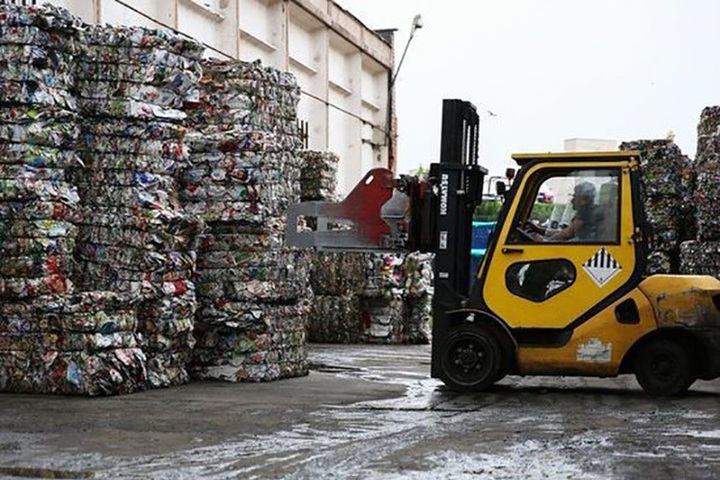Garbage in the era of sanctions: how the Russian recycling industry works in difficult times
[ad_1]

Numerous sanctions aimed at bringing down the Russian economy are not working at all. External pressure on various industries only forced efforts to be redirected in another direction. Such an important area as waste processing and disposal was no exception. The waste reform continues, domestic companies have achieved almost complete import substitution of equipment and have begun exporting their own solutions, and the sector itself is becoming increasingly popular among investors.
“In just four years, since the beginning of the reform, 249 facilities have been built. Their capacity allows them to sort 52.9% and dispose of 12.8% of MSW. Russian investors, who are often re-operators, can count on support measures from the state, compensation for costs and subsidies, but most importantly, return on investment. But REO also considers it important to develop international cooperation. We remain in dialogue with countries that are committed to developing a circular economy, sharing relevant experiences and investing in the environment. We have a large number of requests from Asia – we have already begun to share our experience in creating a municipal solid waste (MSW) management system with India and China. They are ready to implement projects in Russia,” said Denis Butsaev, General Director of the Russian Environmental Operator (REO).
To confirm his words, one can cite the February agreement between REO and the largest Indian packaging recycling company UFLEX. As part of it, joint production of environmental packaging from recycled waste can be created in the country. In addition, a project to create a waste disposal facility for the capital of Algeria is being discussed.
Export of technologies
Instead of becoming a weapon of destruction, sanctions served as a catalyst for economic development. In the waste industry, we not only managed to reduce the level of equipment imports, but also began to export them. Such deliveries are already being made to ASEAN countries. Import substitution for equipment in the industry exceeded 90%, REO reported.
Friendly states are interested in domestic technologies. For example, interested parties in Vietnam and Thailand are gaining experience in working with organic waste. Morocco is also being considered for technology exports. In addition, at the beginning of February, a standard solution for automating the activities of regional operators was presented in Astana. Thanks to the system, you can monitor how garbage trucks move and create the most optimal routes.
“The waste management industry has shown that it can be an independent link in the economy and not depend on external pressure. In this sense, we defended national environmental sovereignty. By 2030, it is planned to create new waste disposal and treatment facilities operating on the basis of a circular economy,” emphasized Rashid Ismailov, head of the Russian Ecological Society.
Ecological waste goes to recyclers
Since the beginning of this year, an updated extended producer responsibility (EPR) mechanism has come into effect. It involves the payment of an environmental fee by businesses, the proceeds of which will be used to finance recycling facilities.
The eco-tax can also be used to compensate for the costs of recycling waste from the use of goods. The head of the League of Waste Paper Recyclers, Alexey Sergeev, believes that the methodology for calculating environmental collection rates is of extremely high quality, both in terms of assessing the actual costs of recycling various types of waste, and in assessing additional cyclical factors that lead to an increase in the basic rates of environmental collection.
Investor interest
Investors in the waste industry, as a rule, are regional waste management operators. Currently, regenerators are engaged in the removal of MSW in all regions of the Russian Federation; in total, there are 182 regenerators. Their annual revenue, according to REO, is about 290 billion rubles.
In 2022-2023, the waste industry has become one of the most popular for public-private partnership projects. Investments exceeded 100 billion rubles in 47 concessions. REO is ready to finance 53 concession projects for 135 billion rubles in 2024-2025. Another 36 projects are being developed by the company.
Quite a few large-scale investment projects are being implemented in the production of products from recycled materials. For example, SIBUR is investing in technologies that make it possible to use recycled plastic in the production of new products. Such projects include the POLIEF enterprise in Blagoveshchensk, where innovative Vivilen polymer granules are produced.
“Since 2022, we have successfully implemented a number of cases with partners on the transition of their production to Vivilen products and have involved over 25 companies in this process. SIBUR not only strives to expand the number of projects in the direction of recycling, but also to improve technology. The development of innovative chemical recycling technologies in our country can make the cycle of processing consumer waste almost endless,” said Maxim Remchukov, Director of Sustainable Development at SIBUR.
Standards for accumulated waste
Industry sustainability is also monitored from a consumer perspective. To calculate the tariff, registrar operators are required to set accumulation standards. In 2023, a new procedure was approved for how this should be done.
“Subjects can always apply the standards that were established through measurements. Comparative analysis data is not applied to the population, except in cases where the standards have been canceled by court. In relation to legal entities, comparative analysis has become popular among the regions for the reason that the current standards are calculated poorly – for the same categories of consumers the standards differed tenfold and the transition to standards calculated at the federal level allows us to solve the problem,” added the member public council under the Ministry of Construction Alexey Makrushin.
[ad_2]
Source link






